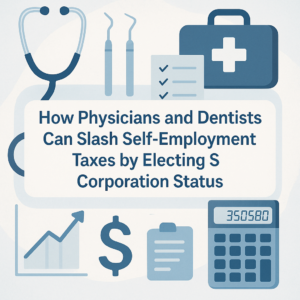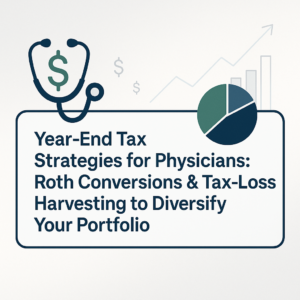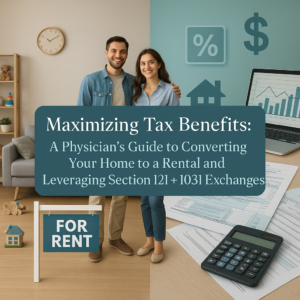As a young healthcare professional stepping into your demanding career—whether you’re a physician, dentist, pharmacist, physical therapist, or psychologist—you’re likely juggling long hours, continuing education, and the desire to maintain a semblance of personal life. Amidst this hectic schedule, hiring household help such as a nanny, housekeeper, or personal assistant can seem like a practical solution to manage daily responsibilities. However, this convenience comes with its own set of challenges, particularly in understanding and fulfilling your tax obligations as a household employer.
The intersection of healthcare professions and personal finance often presents a unique set of complexities. Navigating the labyrinth of tax laws can be overwhelming, especially when your expertise lies in patient care rather than financial regulations. Missteps in handling taxes for household employees can lead to penalties, interest charges, or even legal complications, all of which can detract from your professional focus and tarnish your reputation.
This comprehensive guide aims to demystify the tax implications of hiring household help. We’ll explore the differences between household employees and independent contractors, outline your responsibilities as a household employer, discuss common pitfalls, and provide best practices for compliance. By understanding these critical aspects, you can make informed decisions that safeguard both your personal finances and professional integrity.
Household Employees and Independent Contractors
The first and perhaps most crucial step in managing your tax responsibilities when hiring household help is accurately classifying your worker. The IRS distinguishes between household employees and independent contractors, and this classification dictates your tax obligations.
What Is a Household Employee?
A household employee is someone you hire to perform duties in or around your private residence under your direction and control. This control extends beyond the results of the work to the details of how and when the work is performed. Common household employees include:
- Nannies and Childcare Providers: Individuals who care for your children in your home.
- Housekeepers and Maids: Those who handle cleaning, laundry, and other domestic chores.
- Personal Chefs: Cooks who prepare meals in your home.
- Gardeners and Landscapers: Workers who maintain your home’s outdoor spaces.
What Is an Independent Contractor?
An independent contractor operates independently, providing services to the public at large. They control how the work is performed, supply their own tools and equipment, and often provide services to multiple clients. Examples include:
- Cleaning Services Companies: Businesses that provide house-cleaning services, with their own staff and equipment.
- Self-Employed Tutors: Professionals who offer educational services to various clients.
- Freelance Personal Trainers: Trainers who work with multiple clients, often at different locations.
Determining Worker Status
The IRS uses several factors to determine whether a worker is an employee or an independent contractor, focusing on three main categories:
- Behavioral Control: Do you have the right to control what the worker does and how they do their job?
- Financial Control: Are the business aspects of the worker’s job controlled by you? This includes how the worker is paid, whether expenses are reimbursed, and who provides tools and supplies.
- Type of Relationship: Are there written contracts or employee-type benefits (such as pension plans, insurance, vacation pay)? Will the relationship continue, and is the work performed a key aspect of your regular business?
Misclassifying a household employee as an independent contractor can result in serious tax consequences, including liability for back taxes and penalties.
Tax Responsibilities as a Household Employer
Once you’ve determined that you’ve hired a household employee, you become a household employer and must comply with specific federal and state tax requirements.
Employer Identification Number (EIN)
As a household employer, you need to obtain an Employer Identification Number (EIN) from the IRS. An EIN is a unique identifier used for reporting employment taxes and filing tax returns. You can apply for an EIN online via the IRS website, and the process is straightforward and free of charge.
Withholding and Paying Federal Taxes
Social Security and Medicare Taxes (FICA):
- If you pay your household employee cash wages of $2,600 or more in 2023, you must withhold and pay Social Security and Medicare taxes.
- The combined FICA tax rate is 15.3% of the employee’s wages, with you and your employee each responsible for half (7.65% each).
- You may choose to pay your employee’s share instead of withholding it from their wages.
Federal Unemployment Tax (FUTA):
- You must pay FUTA taxes if you pay cash wages of $1,000 or more to household employees in any calendar quarter.
- The FUTA tax rate is 6% on the first $7,000 of wages paid, but you may be eligible for a tax credit of up to 5.4% if you pay state unemployment taxes, reducing the effective rate to 0.6%.
Federal Income Tax Withholding:
- Withholding federal income tax from your household employee’s wages is optional.
- If your employee requests withholding, they must complete Form W-4, and you must comply.
State Tax Obligations
State tax requirements vary but may include:
- State Income Tax Withholding: Some states require or allow you to withhold state income taxes.
- State Unemployment Taxes: Most states impose unemployment taxes on household employers.
- Disability and Workers’ Compensation Insurance: Certain states mandate that employers provide these benefits to household employees.
Reporting and Filing Requirements
- Form W-2: Provide your employee with Form W-2 by January 31 of the following year and file Copy A with the Social Security Administration.
- Schedule H (Form 1040): Report household employment taxes when you file your federal income tax return.
- Quarterly Estimated Tax Payments: You may need to adjust your estimated tax payments or withholding from your own wages to cover the household employment taxes.
Recordkeeping
Maintain detailed records of:
- Employee’s personal information (name, address, Social Security number)
- Dates and amounts of wage payments
- Taxes withheld and paid
- Employment tax filings
The Risks of Misclassification and Non-Compliance
Understanding the risks associated with misclassification and non-compliance is essential in safeguarding your professional and financial well-being.
Financial Penalties
- Back Taxes and Interest: You may be liable for both the employer’s and employee’s share of FICA taxes, plus interest.
- Penalties for Late Payment: Failure to file and pay taxes on time can result in substantial penalties.
- State Penalties: States may impose additional fines and penalties for non-compliance.
Legal Consequences
- Employment Litigation: Employees may sue for unpaid wages, overtime, or benefits.
- IRS Audits: Misclassification can trigger audits, leading to further scrutiny of your personal and professional finances.
- Criminal Charges: In extreme cases, intentional tax evasion can lead to criminal prosecution.
Professional Repercussions
- Licensing Issues: Legal troubles related to tax non-compliance can jeopardize your professional license.
- Reputation Damage: Negative publicity can harm your reputation among colleagues and patients.
Best Practices for Compliance
Adopting proactive strategies can help you manage your responsibilities efficiently.
Consult with Tax Professionals
- Hire a CPA or Enrolled Agent: Professionals can provide personalized advice and assist with filings.
- Seek Legal Counsel: Attorneys specializing in employment law can help navigate complex regulations.
Utilize Payroll Services
- Household Payroll Services: Companies specialize in handling payroll for household employers, ensuring calculations and filings are accurate.
- Payroll Software: If you prefer a hands-on approach, software can automate calculations and reminders.
Stay Educated on Tax Laws
- IRS Publications: Review IRS Publication 926, “Household Employer’s Tax Guide,” for detailed information.
- Continuing Education: Attend seminars or webinars focused on tax obligations for household employers.
Open Communication with Employees
- Discuss Expectations: Clearly outline duties, work schedules, and compensation.
- Document Agreements: Use written contracts to formalize the employment relationship.
- Provide Pay Stubs: Offer detailed pay stubs showing wages and tax withholdings.
The Role of CPAs and Enrolled Agents in Tax Compliance
Navigating tax obligations can be simplified with professional assistance.
Understanding CPAs and Enrolled Agents
- Certified Public Accountants (CPAs): Licensed professionals with extensive accounting education and experience.
- Enrolled Agents (EAs): Tax specialists authorized to practice by the IRS, with expertise in tax law and representation.
Services Provided
- Tax Preparation and Filing: Ensuring all forms are correctly completed and submitted on time.
- Tax Planning: Advising on strategies to minimize tax liability within legal boundaries.
- Representation: Acting on your behalf in dealings with the IRS.
Selecting the Right Professional
- Experience with Healthcare Professionals: Choose someone familiar with the unique financial situations of your profession.
- Expertise in Household Employment Taxes: Verify their knowledge in this specific area.
- Credentials and References: Check licenses, certifications, and client testimonials.
Conclusion
Balancing a demanding healthcare career with personal life is no small feat. Hiring household help can significantly alleviate daily pressures, allowing you to focus on your patients and personal well-being. However, this convenience comes with the responsibility of understanding and complying with tax obligations as a household employer.
Remember, while the intricacies of tax law may seem daunting, you are not alone. Resources abound—from IRS publications to professional advisors—that can assist you in navigating these complexities. Taking proactive steps today not only ensures compliance but also contributes to a stable and prosperous future.
Disclaimer: This article is intended for informational purposes only and does not constitute legal, tax, or financial advice. Consult with a qualified professional to address your individual circumstances.






